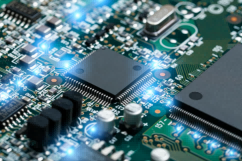 Trade Policy
Trade Policy
 04-07-2023
04-07-2023
As the U.S. continues to impose export controls on AI chips, and companies like Nvidia and AMD adapt to these changes, several possible future developments related to chips could arise:

Emergence of Alternative Chip Sources
The restrictions placed on American chipmakers might spur the development of alternative chip sources. Countries like China, which have been heavily investing in their semiconductor industries, might accelerate their efforts to become self-reliant. Other countries might also enter the fray, seeing a strategic or economic opportunity in producing their own chips.
Increased Investment in Domestic Chip Technologies
China might respond to the U.S. export controls by ramping up its investments in domestic chip technologies. This could involve direct investment in domestic chip manufacturers, incentivizing private sector research and development, establishing research partnerships with universities, and implementing policies that promote the use of domestic chips over imported ones.
Potential for Technological Leapfrogging
Technological leapfrogging could be a potential outcome of the export controls. Leapfrogging occurs when countries or companies skip over older technologies to adopt newer ones, often due to external constraints. If American AI chips remain inaccessible, Chinese firms might seek to leapfrog existing technology and pioneer new approaches to AI and computing, such as neuromorphic chips or quantum computing.
Development of Workarounds
Companies may devise innovative ways to circumvent the restrictions. For instance, chipmakers might develop new chips that, while not as powerful as those currently being restricted, still meet the needs of their customers without falling foul of the export controls. Additionally, companies might find novel ways to structure their businesses or products to avoid being affected by the regulations and continue their operations smoothly.
Escalation or Resolution of Trade Tensions
The future of the U.S.-China tech war is uncertain. While an escalation of tensions is possible, with each side imposing further restrictions and penalties, there is also potential for negotiation and resolution. Changes in political leadership or global events might lead to a softening of positions and a return to more open trade conditions for chips and other technologies.
Influence of Third-Party Nations
Other countries, such as those in the European Union or other Asian nations, could play a significant role in future developments. They might align with either the U.S. or China or adopt a neutral position. Their decisions could be influenced by a variety of factors, including economic considerations, geopolitical alliances, and their own technological capacities. These countries' actions and policies will have implications for the global chip industry and its future trajectory.
Overall
Given the complexity and rapid evolution of the situation, these are just potential scenarios. The exact path the future will take is uncertain and will depend on a confluence of factors, including policy decisions, corporate strategies, technological advancements, and the broader geopolitical landscape. As such, it's crucial for stakeholders in the chip industry to stay informed and agile, ready to adapt to whatever the future holds.
Category
Leave Message for Demo Request or Questions


 T-info
T-info T-discovery
T-discovery

 My
Tendata
My
Tendata Market Analysis
Market Analysis Customer
Development
Customer
Development Competitor
Monitoring
Competitor
Monitoring Customer Relationship
Customer Relationship





































































































































